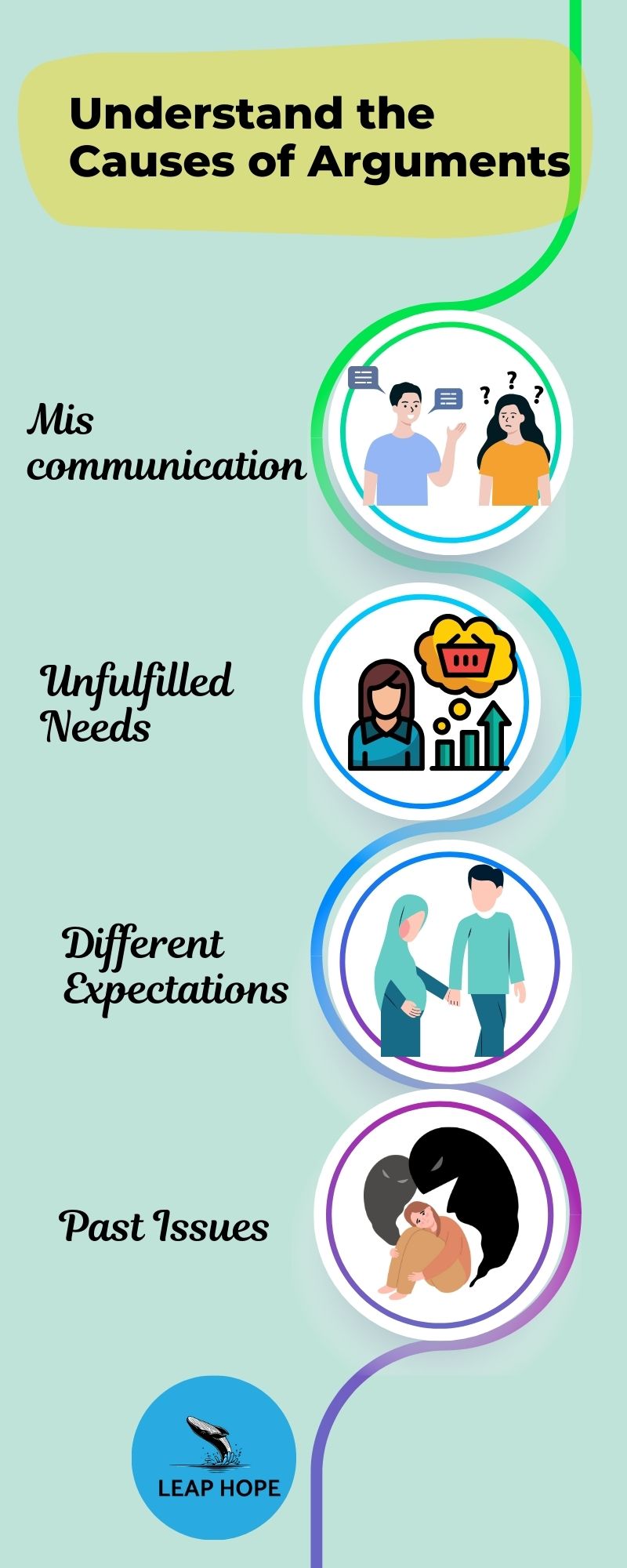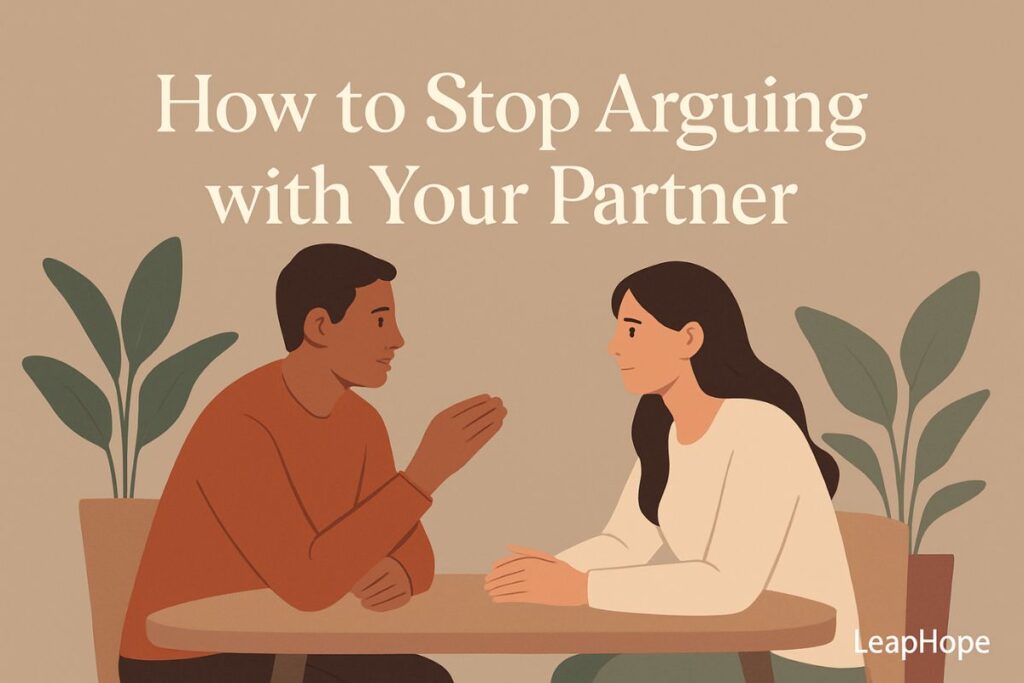Most couples don’t argue because they enjoy conflict. They argue because something small turns emotional faster than they expect, and suddenly they’re stuck in the same fight again.
When arguments spiral, it’s rarely about the topic itself. It’s about how quickly conversations shift from solving a problem to protecting feelings. One comment feels dismissive. One tone feels sharp. Within minutes, both people are defending instead of listening.
Not all arguments are a sign that something is wrong. Some disagreements pass once emotions settle. But when fights escalate quickly, repeat often, or leave one or both partners feeling drained, it’s worth paying attention to how you’re arguing, not just what you’re arguing about.
This guide focuses on stopping arguments in the moment, before they turn into damage. Not by avoiding conflict or forcing calm, but by recognising the patterns that make conversations blow up and learning how to slow them down when it actually matters.
The Two Types of Arguments in Relationships
Not all arguments mean the same thing. Some are part of daily life. Others are signs that something deeper isn’t being addressed.
Everyday arguments that come and go usually show up around routine stress, chores, schedules, or small misunderstandings. They may feel irritating in the moment, but once emotions settle, the issue doesn’t linger. You might disagree, cool off, and move on without it affecting how safe or connected you feel with each other.
These arguments don’t feel good, but they don’t leave a lasting mark.
Deeper conflicts that keep coming back feel different. They often resurface around trust, feeling unheard, emotional closeness, or major decisions. The topic may change, but the emotional pattern stays the same. Conversations escalate quickly, past issues resurface, and resolution feels temporary or nonexistent.
Over time, these arguments don’t just stay about the issue. They start affecting how comfortable you feel speaking openly, how safe disagreements feel, and whether conversations end in understanding or withdrawal.
When Arguing Is Normal and When It’s a Sign Something Is Off
Not all arguing means a relationship is in trouble. Some couples disagree often but recover quickly. Others argue less, yet feel emotionally distant afterward. The difference isn’t how often you fight, but what happens during and after those conversations.
Arguing can be normal when:
- Disagreements stay focused on one issue
- Both people calm down without feeling dismissed
- The same argument doesn’t replay every week
- You feel closer or clearer afterward, not drained
In these cases, arguments are part of adjusting to each other.
Arguing becomes a problem when:
- Almost every conversation turns tense
- Small topics escalate fast
- One or both of you feel unheard or blamed
- The same fights repeat without resolution
This is often what people mean when they say, “We can’t talk without arguing.”
What many people misunderstand
Trying to “stop arguing” by staying quiet, giving in, or forcing calm usually backfires. Unspoken frustration builds, and the next disagreement explodes faster. The goal isn’t silence, it’s learning how to slow conversations down before they turn defensive.

Why Do Couples Argue? Understanding the Real Causes
Most arguments don’t start because someone wants a fight. They start because something small lands the wrong way, and neither person feels fully understood.
Here are some of the most common reasons couples argue, not in theory, but in real day-to-day conversations.
Miscommunication
Many arguments begin with assumptions. A comment sounds dismissive. A tone feels sharp. One partner reacts to what they think was meant, not what was actually said. Once emotions take over, clarity drops, and the conversation shifts from understanding to defending.
Unfulfilled emotional needs
Arguments often show up when someone feels overlooked, disconnected, or taken for granted. The fight may be about time, attention, or effort, but underneath it is usually a need that hasn’t been acknowledged out loud.
Different expectations
Partners don’t always realise how different their expectations are until conflict exposes them. How money should be handled, how decisions are made, or what “support” looks like can vary widely. When these expectations aren’t talked about, frustration builds quietly and then surfaces as repeated arguments.
Unresolved past issues
Some arguments feel bigger than the moment because they carry old weight. Previous hurts that were never properly addressed tend to resurface during new disagreements, making small issues feel heavier and harder to resolve.
Understanding these causes doesn’t stop arguments by itself, but it helps explain why the same conversations keep circling back instead of moving forward.
How to Stop Fights from Escalating
If arguments keep getting heated, the goal isn’t to win or shut things down. It’s to slow the conversation before it turns into something harder to repair.
1. Set boundaries for how you argue, not what you argue about
Productive arguments have limits. Agreeing not to yell, insult, interrupt, or bring up unrelated past issues helps keep disagreements from turning personal. These boundaries don’t solve the issue, but they prevent unnecessary damage while you talk.
2. Choose timing over urgency
Many arguments escalate simply because they happen at the wrong moment. When one or both of you are tired, stressed, or already overwhelmed, even small issues can explode. Waiting until both of you are calmer often changes the entire tone of the conversation.
3. Take responsibility without turning it into self-blame
Owning your feelings doesn’t mean taking all the fault. It means saying how something affected you without attacking your partner’s character. This shifts the conversation from defence to understanding.
4. Focus on understanding before being understood
When both people are trying to prove a point, nobody feels heard. Slowing down, listening fully, and acknowledging the other person’s feelings often lowers tension faster than any explanation ever will.
5. Take breaks before things get out of control
Walking away for a short time isn’t avoidance when it’s done intentionally. Pausing heated conversations gives emotions time to settle so you can return without escalating further. The key is agreeing to come back and continue, not leaving issues unresolved.
Why listening matters during arguments
Most arguments intensify when one or both people feel ignored, dismissed, or talked over. Feeling heard doesn’t require agreement, but it does require attention, patience, and respect.
Taking Time to Process After an Argument
Not every issue needs to be resolved immediately. After an argument, taking time to reflect can prevent reactive comments that make things worse. A short pause helps both people return to the conversation with clearer thoughts and less emotional charge.
Processing time isn’t about avoiding the issue, it’s about responding instead of reacting.
When Outside Help Actually Makes Sense
If the same arguments repeat despite genuine effort, or if conversations regularly leave one or both of you feeling unsafe, unheard, or shut down, outside support can help. Professional guidance isn’t about blaming either partner, it’s about understanding patterns that are hard to change on your own.
Final Thought
Arguments are a normal part of close relationships, but constant fighting isn’t something to ignore. When disagreements keep escalating, it’s usually a sign that the way you’re communicating needs attention, not that the relationship itself is broken.
Learning how to slow conversations down, listen without defending, and pause before reacting can reduce conflict and make disagreements feel less damaging and more manageable.




